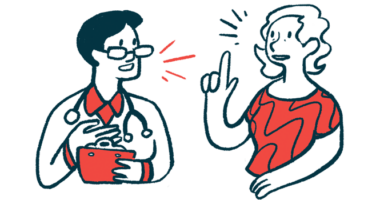
Hereditary angioedema and women
Last updated May 20, 2024, by Lindsey Shapiro, PhD

Hereditary angioedema (HAE) is generally found to be diagnosed in men and women equally, but how it affects each sex can be different.
In general, women who have the rare disease are found to experience more frequent and severe swelling attacks than their male counterparts. Hormonal changes throughout life can also mean HAE symptoms fluctuate significantly for female HAE patients. For this reason, adjustments to disease management may be required at different stages.
The disease itself might also make certain aspects of standard women’s health-related care, such as contraceptive use and pregnancy, more complicated and require careful discussions between a woman and her healthcare providers to make sure she stays healthy throughout all stages of life.
Role of sex hormones
The relatively more severe disease presentation observed in women with HAE is believed to, in part, be related to estrogen, a female sex hormone. Women commonly report the onset or worsening of HAE symptoms during times when estrogen levels surge, such as when taking oral contraceptives or during pregnancy.
Moreover, HAE type 3, which mainly affects women, is commonly found to be estrogen-dependent, meaning the onset of attacks corresponds with increases in the sex hormone.
The exact ways estrogen might influence HAE attacks are not entirely understood, but a number of studies indicate that the hormone influences the production or activity of bradykinin, a molecule that plays a key role in triggering HAE swelling attacks and is involved in inflammation.
Preclinical studies have shown that estrogen exposure enhances bradykinin signaling and regulates the levels and activity of receptors to which bradykinin binds. Estrogen exposure in women also is associated with elevated blood levels of bradykinin and the molecules needed to produce it, namely factor XII and kallikrein. Increased estrogen levels also are associated with reductions in C1-INH, a protein that inhibits bradykinin production.
The other main female sex hormone, progesterone, does not appear to trigger or worsen HAE. In fact, some reports suggest progesterone-containing medications might ease HAE attacks.
Life stages
Estrogen levels change as girls and women experience different stages of life, and the signs and symptoms of HAE may change with them. Still, HAE symptoms can vary significantly from person to person, and not every female HAE patient will be affected in the same way by hormonal fluctuations. While some women may find that a life stage transition worsens her HAE symptoms, others may notice the opposite.
The care of women with HAE throughout different life stages may be more complicated than it is for women who do not have the disease. A gynecologist and/or obstetrician will need to work closely with the doctor treating a woman for HAE, as well as her other healthcare providers, to ensure she is managing her HAE and addressing her general health needs.
Puberty and menstruation
During puberty, when the body sexually matures, a girl’s body will start to produce more sex hormones, especially estrogen. Female HAE patients might experience their first swelling attack during this time, or existing attacks may become more severe or frequent.
Sex hormones also fluctuate during the menstrual cycle. About a third of female HAE patients report an increased frequency of HAE attacks during menstruation, while 14% report it increasing during ovulation.
When menstruating, it can be difficult to know whether abdominal issues are period-related or from HAE because of some overlapping symptoms. Careful evaluations and responses to HAE treatments can help in determining which is the actual cause.
Contraception and pregnancy prevention
Oral contraceptive pills containing estrogen are found to worsen or trigger symptoms in women with HAE, and stopping these medications often relieves symptoms for many. Because of this, estrogen-containing contraceptives are generally not recommended to women with HAE unless they are already being taken and are well tolerated. Contraceptives containing only versions of progesterone may reduce HAE attack frequency, which is why they are recommended as an alternative to estrogen-containing pills.
Intrauterine devices, or IUDs, also are generally well tolerated. But rescue medications should always be available in case an HAE attack occurs while an IUD is being inserted. Barrier methods of contraception (e.g., condoms) do not seem to affect HAE symptoms.
If emergency contraception is needed after intercourse, estrogen-containing pills are not recommended because of the possibility of worsening HAE attacks. Women with HAE should always talk with their doctors about any medications they’re taking and what might be the right method for avoiding pregnancy in their particular case.
Family planning
Because HAE is a hereditary disease, a woman with any form of it has a 50% chance of passing the condition on to her future children. Genetic counseling can help people understand HAE inheritance patterns and make informed decisions related to family planning.
Women with HAE are generally not found to be at an increased risk of infertility. If a woman with HAE tries in vitro fertilization, or IVF, to help her get pregnant, the hormones used during this process can lead to estrogen surges that bring on an HAE attack and preventive treatment may be needed.
Pregnancy, labor, and the postpartum period
Pregnancy, which causes substantial rises in estrogen and progesterone, can have varying effects on a woman’s HAE symptoms. About a third of pregnant women who have HAE report that their symptoms worsen during pregnancy. A similar percentage of women with HAE indicate their symptoms did not change or got better. Studies indicate that the frequency of attacks during one pregnancy does not necessarily predict attack rates during subsequent ones.
Evidence suggests that women with HAE are not at a higher risk of pregnancy complications such as miscarriage, premature delivery, or need for a cesarean section. The stress of a C-section is more likely to induce an HAE attack than vaginal delivery. In either case, on-demand HAE treatments should be available to women during labor.
HAE attack rates may increase in the first days after delivery or while lactating. Stopping breastfeeding is linked to a decrease in HAE attacks. A woman and her healthcare providers should work together to figure out a treatment plan if she is planning to breastfeed.
Some HAE medications may not be recommended during pregnancy or if breastfeeding, so women should always discuss with their healthcare providers which medications are safe for them.
Menopause
During menopause, when women stop menstruating, hormone levels again shift and estrogen levels drop. While more than half of women don’t experience any change in HAE symptoms with the onset of menopause, about a third have indicated their symptoms worsened.
Hormone replacement therapies containing estrogen that are sometimes used to manage the symptoms of menopause are not recommended for women with HAE. Progesterone-containing medications or nonhormonal treatments may be safer alternatives.
HAE and other women’s health issues
Women with HAE are not at an increased risk of breast cancer or cancer of the reproductive system. They should receive routine screening as any other woman.
However, women who develop breast cancer may need to stop certain HAE medications. Estrogen-modulating cancer treatments typically need to be used with caution in women who have HAE due to the possibility they could make HAE symptoms worse.
Angioedema News is strictly a news and information website about the disease. It does not provide medical advice, diagnosis or treatment. This content is not intended to be a substitute for professional medical advice, diagnosis, or treatment. Always seek the advice of your physician or other qualified health provider with any questions you may have regarding a medical condition. Never disregard professional medical advice or delay in seeking it because of something you have read on this website.
Recent Posts



